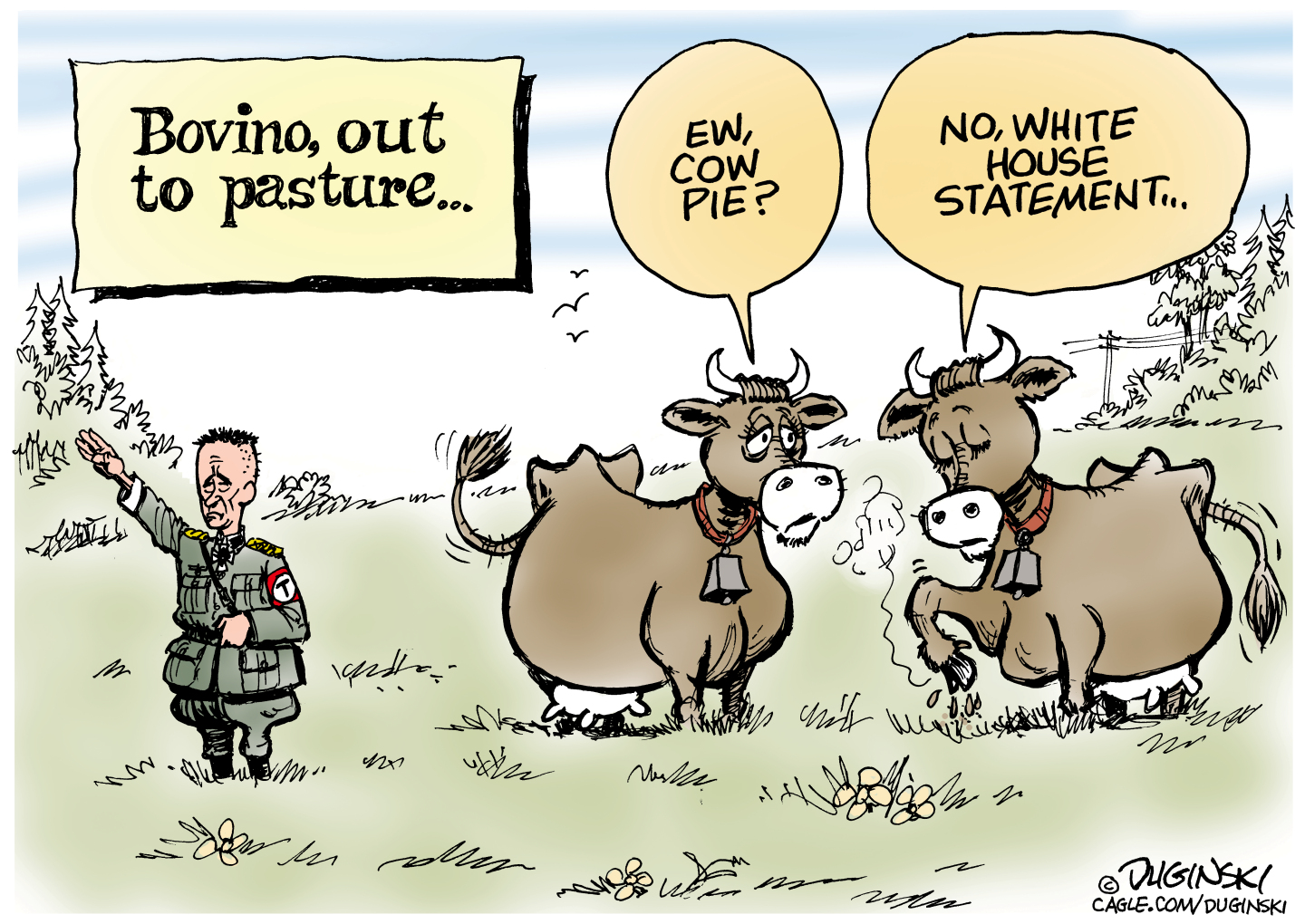The GOP's partisanship trap
Why Democrats can't quit bipartisanship — and how Republicans use it against them


Democratic voters love bipartisanship. GOP voters do not. Republicans have learned to weaponize that asymmetry over the years. And sure enough, they're relying on it now to defend President Trump from impeachment.
Of course, Republicans want to appear as though they abhor partisan bickering and value compromise. We see this on display now, as Republicans argue that the impeachment of President Trump is a partisan sham.
"At the end of the day, the case isn't made," Rep. Doug Collins (R-Ga.) argued at the close of Monday's impeachment hearing in the House Judiciary Committee. "This is the first impeachment that is partisan on facts that are not agreed to."
The Week
Escape your echo chamber. Get the facts behind the news, plus analysis from multiple perspectives.

Sign up for The Week's Free Newsletters
From our morning news briefing to a weekly Good News Newsletter, get the best of The Week delivered directly to your inbox.
From our morning news briefing to a weekly Good News Newsletter, get the best of The Week delivered directly to your inbox.
Hugh Hewitt, the conservative radio host, last month wrote about "what looks to be the first purely partisan vote to impeach" and fretted about "the horrible precedent a purely partisan impeachment would set."
Last week, Senate Majority Leader Mitch McConnell (R-Ky.) thundered against the "rushed and partisan impeachment" taking place in the House.
This is an old trap. Republicans have spent years distorting the very ideas of compromise and common ground, setting bipartisanship as a goal for Democrats, but forever denying its fruition. The GOP has been using this tactic to win fights with Democrats at least since the very earliest days of Barack Obama's presidency.
Obama, you'll remember, came to national attention with a stirringly bipartisan speech in one of the most partisan settings possible: the 2004 Democratic National Convention. "We worship an awesome God in the Blue States, and we don't like federal agents poking around in our libraries in the Red States," he said. Four years later he became president.
A free daily email with the biggest news stories of the day – and the best features from TheWeek.com
Republicans quickly settled on a strategy: They would oppose every idea Obama had, every program and initiative — no matter how broad the appeal. Why? Because voters hate gridlock — and GOP strategists decided voters would blame president, even if he didn't deserve it.
"We're not here to cut deals and get crumbs and stay in the minority for another 40 years," then-Rep. Eric Cantor (R-Va.) said at the time. "We're going to fight these guys."
This required some wild contortions for the GOP. Obama dusted off a health-care plan that was hatched in a conservative think tank and had been passed by Republicans in Massachusetts, but couldn't sell it to their counterparts in Washington, D.C. McConnell voted for a bailout bill as the Great Recession started under President Bush — then tried to block its implementation under Obama. In 2012, McConnell even ended up filibustering a bill he himself had introduced, just to deprive Democrats of a victory.
It worked. ObamaCare passed Congress along partisan lines — and a few months later, Republicans won control of the House.
Given that history, Democrats should be leery of GOP appeals to bipartisanship. Even as they prepare to impeach Trump, though, they are are on the cusp of giving him a victory on his USMCA trade treaty intended to replace NAFTA. The benefits of the new agreement are in dispute, but "ratifying the agreement would also concretely help Trump as the 2020 election gets going," letting him boast of a rare bipartisan accomplishment, my colleague Ryan Cooper noted earlier this month. "It also goes without saying that the Republican leadership would never, ever, ever help Democrats in this way."
Indeed, that the Democrats would allow Trump a win in this environment seems crazy. "So, can someone explain to me why Dems appear about to sign on to Trump's USMCA trade deal?" liberal New York Times columnist Paul Krugman tweeted this week. "It's basically no change from NAFTA as is, but Trump will claim it as a triumph. Why give him that?"
But it makes sense when you remember that Democrats like the idea of compromise more than Republicans do. Polls consistently demonstrate this truth: A 2018 survey showed that 66 percent of Democrats favor compromise, compared to just 36 percent of Republicans. A 2017 poll put the split at 62 percent and 44 percent, respectively. The trend held even in 2010, when Obama held the White House.
The Democrats' misguided commitment to compromise and moderation can be seen in House Speaker Nancy Pelosi's (D-Calif.) fussing over the swing-district moderates in her caucus while progressives chafe. It's on display as former Vice President Joe Biden leads the Democratic presidential pack on an impossible promise to woo congressional Republicans. They understand that talking about compromise and moderation is the best way to generate support from their own voters. That may frustrate progressive activists, but elites like Pelosi and Biden want to win elections, and they think bipartisanship is their best shot. Meanwhile, President Trump may be able to win re-election, despite broad unpopularity, simply by trying to appeal only to his own base.
Given those trends, it isn't shocking that Pelosi tried so long to avoid impeachment. Actually, it's surprising she isn't doing more to seek a middle ground, like censure. But impeachment doesn't really lend itself to a bipartisan compromise — either Trump tried to subvert the 2020 election by pressuring Ukraine, or he didn't. It's that simple.
The evidence suggests Trump crossed the line. Officials said Monday night that the House will vote next week on two articles of impeachment against Trump. But Republicans won't vote for his impeachment, no matter how overwhelming the facts. They have their reasons. Don't be fooled. In the GOP's hands, pretending to care about bipartisanship is the most partisan act of all.
Want more essential commentary and analysis like this delivered straight to your inbox? Sign up for The Week's "Today's best articles" newsletter here.
Joel Mathis is a writer with 30 years of newspaper and online journalism experience. His work also regularly appears in National Geographic and The Kansas City Star. His awards include best online commentary at the Online News Association and (twice) at the City and Regional Magazine Association.
-
 5 redundant cartoons about Greg Bovino's walking papers
5 redundant cartoons about Greg Bovino's walking papersCartoons Artists take on Bovino versus bovine, a new job description, and more
-
 31 political cartoons for January 2026
31 political cartoons for January 2026Cartoons Editorial cartoonists take on Donald Trump, ICE, the World Economic Forum in Davos, Greenland and more
-
 Political cartoons for January 31
Political cartoons for January 31Cartoons Saturday's political cartoons include congressional spin, Obamacare subsidies, and more
-
 The billionaires’ wealth tax: a catastrophe for California?
The billionaires’ wealth tax: a catastrophe for California?Talking Point Peter Thiel and Larry Page preparing to change state residency
-
 Bari Weiss’ ‘60 Minutes’ scandal is about more than one report
Bari Weiss’ ‘60 Minutes’ scandal is about more than one reportIN THE SPOTLIGHT By blocking an approved segment on a controversial prison holding US deportees in El Salvador, the editor-in-chief of CBS News has become the main story
-
 Has Zohran Mamdani shown the Democrats how to win again?
Has Zohran Mamdani shown the Democrats how to win again?Today’s Big Question New York City mayoral election touted as victory for left-wing populists but moderate centrist wins elsewhere present more complex path for Democratic Party
-
 Millions turn out for anti-Trump ‘No Kings’ rallies
Millions turn out for anti-Trump ‘No Kings’ ralliesSpeed Read An estimated 7 million people participated, 2 million more than at the first ‘No Kings’ protest in June
-
 Ghislaine Maxwell: angling for a Trump pardon
Ghislaine Maxwell: angling for a Trump pardonTalking Point Convicted sex trafficker's testimony could shed new light on president's links to Jeffrey Epstein
-
 The last words and final moments of 40 presidents
The last words and final moments of 40 presidentsThe Explainer Some are eloquent quotes worthy of the holders of the highest office in the nation, and others... aren't
-
 The JFK files: the truth at last?
The JFK files: the truth at last?In The Spotlight More than 64,000 previously classified documents relating the 1963 assassination of John F. Kennedy have been released by the Trump administration
-
 'Seriously, not literally': how should the world take Donald Trump?
'Seriously, not literally': how should the world take Donald Trump?Today's big question White House rhetoric and reality look likely to become increasingly blurred
